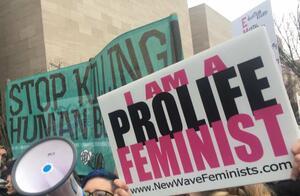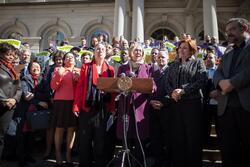Why Pro-Life Women Have No Place in the Feminist Movement
Several weeks ago, the New York Times published an op-ed by one Lauren Enriquez, public relations manager at the Human Coalition, an organization whose website refers to legalized abortion as “the worst holocaust in human history” (which: really?). In her article, Enriquez took umbrage with the Women's March organizers' refusal to ally with pro-life feminist groups. She claimed that the Trump-era feminist movement is excluding the many women who oppose abortion but still self-identify as feminists. She argued that it's unfair for the March organizers to take a stand on something that's a matter of debate, that feminists are allowed to disagree on.
My stomach ached as I read Enriquez's op-ed, a visceral reaction to encountering an argument that I so deeply and fundamentally disagree with. But after I finished reading, I pushed down the ache and tried to parse through her piece logically. Did Enriquez have a point? Does modern feminism exclude some American feminists by excluding pro-life women?
I posed this question to my friends at a bachelorette party several weeks ago.
“Of course they should be included,” said one. “Feminism is all about inclusivity, isn't it?”
Feminism is all about inclusivity. That's the sticking point. In theory, I'm all about intersectionality, all about welcoming women from diverse backgrounds, with diverse belief systems, creeds, and callings: women who wear burkas or makeup or who don't shave their legs, who have high-powered careers or decide to be stay-at-home moms, who hail from the highest and lowest ends of the socioeconomic spectrum.
So why shouldn't my inclusivity include pro-life women?
In thinking about this issue, I delved deeper into researching this particular modern pro-life movement, which has branded itself as hip and accessible to the millennial generation (a note: I'm calling them pro-life only because that's what they call themselves). There's almost a hippie-like sheen to some of the language they use: one of their cornerstone arguments is that abortion oppresses women by forcing them into the workforce and denying them the right to their natural state of motherhood. It implies that if it weren't for abortion, we would be sitting in a field of flowers with our babies, which is what all women have always wanted anyway. It's actually all very Phyllis Schlafly-esque but the conservative rhetoric has been dressed up in quasi-moon goddess language.
A central tenet of the modern pro-life argument is that if women received more personal support from family members and social support from the government, they would not be driven into the cold arms of the abortion clinic. In this, Enriquez is not wrong. The other, less-discussed side of reproductive justice is the right to have a child when you want to, to not have to sacrifice your career or your financial stability in order to have a family. I can't disagree with Enriquez when she says that we need better systems, both on the personal and political level, to aid and support parents in our society.
Taking into account this very valid point, then, is Enriquez right? Do pro-life women simply have a different idea for how to best support women through their child-bearing years? Is this a difference of opinion that we should embrace and nurture within the feminist movement? When it comes to reproductive rights, can there be different, equally valid, perspectives?
I thought about it more. And, I decided that the answer is no.
Here's the thing. Support for working parents and abortion rights are not mutually exclusive. We can change our social support systems to enable women to have children without bankrupting themselves or sacrificing their careers and we can still allow women to obtain safe, affordable abortions. The whole point of the pro-choice movement is that it's a choice. The definition of “pro-choice” in Mirriam-Webster is “favoring the legalization of abortion.” I think this is a point of confusion: many women think that because they would never choose to have an abortion, or because they feel uncomfortable with abortion, or even because they personally think abortion is morally wrong, then they belong in the pro-life camp. But that's simply not true. If you support Roe v. Wade and believe abortion should be legal, you are pro-choice, no matter whether you would ever choose abortion for yourself. Full stop.
On the other hand, the cornerstone of the pro-life movement is the criminalization of abortion–– in other words, advocating for legal restrictions over other women's bodies.
There's a misconception that feminism means supporting all women, no matter what they do and believe, but that's not the case. Some women internalize misogyny; some women are complicit in political and social oppression (I think you know who I'm referring to here); some women actively try to hurt and control other women. Not all belief systems are created equal: there is a set of political beliefs and values that's conducive to women's equality, and there's a set of political beliefs and values that actively works against women’s political and personal autonomy. The belief that women have the right to decide if and when they bear children is intrinsic to feminism.
It may be useful to distinguish here between feminism as a life philosophy and feminism as a specific social justice movement. No one can stop pro-life women from living in accordance with some feminist values, and indeed, I don’t want to stop these women from gleaning what they can from feminism. Our foremothers fought for women’s personal autonomy and the right of each women to live, and think, independently. You are welcome to embrace, enjoy, and benefit from feminist values as a pro-life woman—but don't expect an invitation to the social justice movement.
If you're still not convinced that pro-life women should be excluded from the social justice movement of feminism, consider this: the second-wave feminists didn't fight so hard for abortion rights for abstract philosophical reasons. When abortion was illegal, women died in droves thanks to septic poisoning or other complications from shady abortions, as well as from suicide after being forced to bear children they didn't want. After abortion was decriminalized in New York State in 1971, the maternal mortality rate there dropped 45 percent. That's right. Forty-five percent fewer pregnant women died in New York State after they were permitted safer, easier access to abortion.
And now, with Roe v. Wade once again on the table thanks to Trump's conservative Supreme Court pick, up to 33 states are in danger of returning to pre-1973 laws, and quite likely to those pre-1973 mortality statistics.
The numbers don't lie. The pro-life movement is intrinsically misogynist, and self-identified pro-life feminists are living an inherent contradiction.








I will never understand people who think a fetus that isn't a conscious human being is more important than the woman carrying that fetus. Why can't these pro lifers get over it and just leave us women alone? If you don't want an abortion then don't get one. Just stay out of other people's business ffs.
The whole point of the "pro life" movement is it's a "CHILD" not a "choice"
Please respect life. We are made in the image of God, saved by grace by the son of God, Jesus Christ, who died for the sins of the world. We are made to love and be loved, to heal and be healed, to forgive and be forgiven. A baby in the womb is a separate independent person who like us all is interdependent for life. Stop the madness of rights. It is not your right to kill a most precious beautiful child. It is your right not to parent, love or take care of it. Please give your child to an adoptive married couple who will. Thank you for being gentle and humble in heart. The sacred protection of the womb is the courage and strength of our society to recognize abortion is wrong. Ultimately if abortion is legal there is no society only murdering thieves dressed in sheep clothing.
These do-gooder pro-lifers are just the worst. The ones who are opposed to abortion out of love for women are the most lost. Women are not shelter pets. We are sovereign. We are not morally lesser. The only friend to a woman considering an abortion is one who directs her to confer with her own Soul. You can not be a feminist if you do not support safe, legal and accessible abortion care. It is an entirely different issue to believe that having an abortion is morally wrong. Being a feminist means fully valuing the sovereignty of other compassionate people.
Emily, I have spent my life teaching, loving, and equipping young women in search of their value and purpose. I volunteer my time to love incarcerated women, single pregnant moms, troubled teen girls, women suffering post-abortive trauma, those who have endured physical, sexual abuse, and thousands more. I believe ALL life is sacred. So your statement "The pro-life movement is intrinsically misogynist" is a falsehood. It's sad for you to make such a false judgement on women like me who spend themselves on behalf of other women's beauty and worth. Maybe you should come over for coffee? And meet a real live woman who fights for women every day to believe the best of themselves and achieve their dreams. You are welcome at my events and in my home, any time. There is always a seat at my table for you. Secondly, this statement begs to be addressed, "On the other hand, the cornerstone of the pro-life movement is the criminalization of abortion–– in other words, advocating for legal restrictions over other women's bodies." -- I disagree. I have too many women in my office crying tears of regret over losing their babies when they were in college. These women have deep pain and profound grief, and ache to hold their children in heaven one day. Am I "misogynist" and "controlling" when I wrap my arms around these women and cry with them, assuring them of God's grace and eternal love? Believing that all children have a right to life has nothing to do with legal restrictions over women's bodies. This is a belief that CHILDREN have a right to live. Your mother chose life didn't she? Are you glad she did? I would hope that those of you who fight and protest and march for "choice" also grieve over the millions of babies lost. What could their dreams have been? Their gifts? Their talents? What would they have looked like? What love and joy and purpose could they have had? Could they have blessed an adoptive family? Only in heaven will we know. And when we see them there, may we embrace them as if they were our own. Jennifer Strickland www.URMore.org
In reply to Emily, I have spent my life by Jennifer Strickland
Hi Jennifer, thank you very much for your comment. I sincerely appreciate you taking the time to share your perspective. My post was just the first in a series of posts about abortion, reproductive rights, sexuality, and health. We would love to invite you to submit a guest post to run as part of that series. We welcome your opinion and conversations around this difficult topic. Thank you again for posting your opinion, and please contact us if you would be interested in presenting your perspective.